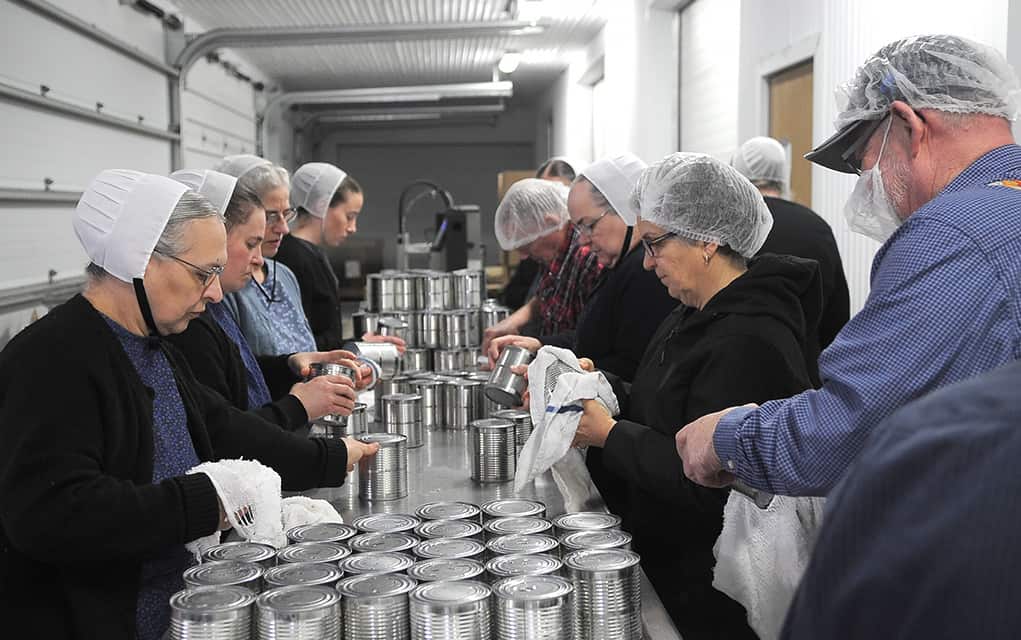There was a flurry of activity in Elmira this week as hundreds of volunteers participated in the Mennonite Central Committee’s (MCC) annual meat canning charity event. Volunteers from Elmira and the neighbouring communities prepared some 44,000 pounds (20,000 kgs) of meat into food supplies for those in need.
The event kicked off at the start of the week with the arrival of MCC’s mobile meat canner at the Elmira Produce Auction Centre. Each year, the mobile canner makes a months-long journey to communities across the U.S. and into Ontario, stopping along the way for dozens of canning events like the one that takes place in Elmira. The charity is linked strongly with the traditional Mennonite communities of North America, who have been participating in it for years.
“It is quite unique. I don’t know that any other organization does this, but the output is quite substantial,” said MCC Ontario executive director John Head.
The canner began its journey back in October, and has been travelling in the months since: from Ohio to Kansas, Nebraska, Oklahoma, through Pennsylvania and finally into Ontario. Elmira is one of only two Canadian communities participating, and is the second-last stop on the canner’s itinerary. After Elmira, the last stop will be in Leamington for the week of April 30.
“It’s a big community effort,” said Neil Martin, chair of the Elmira meat canning committee, which organizes the local event.
“You have individuals from the community that volunteer. You have youth groups from different churches that volunteer, and even some people from different churches … that’s the bulk of the volunteers,” he said, adding that volunteers will come from as far as Mount Forest and Milverton.

The meat canning is an international event, but it is the local organizing committees which determine the success of the charity. Through fundraising and facilitating the donations of money, animals and meat, the Elmira committee was able to generate 44,000 lbs of meat that will all be cooked, seasoned, canned and boxed by the volunteers.
“It’s almost like an assembly line, where the process is started with cut-up chunks of meat and then it’s put into the can, then it’s seasoned and then it’s sealed and then the labels are put on it,” explained Head of the work that volunteers put into the canning.
“There’s a bunch of generous people amongst the Mennonites,” said Martin of the mostly Mennonite volunteers. “And this is something that they can dig in with their hands and see the end result and at the end of the day they can say they helped with some charity.”
Last year, a total of 570,000 lbs of beef, turkey, chicken and pork was prepared by volunteers and shipped to besieged and beleaguered communities around the world. Ethiopia was the largest benefactor of the project, receiving about 225,000 lbs worth of food supplies, followed by the Ukraine, North Korea, Burundi and then Nicaragua.
All the food prepared in Elmira will get shipped to a warehouse, from where it can be dispersed across the world, wherever the need is greatest, said MCC’s Head, such as conflict zones and areas affected by natural disasters.
“Those have to be flexible depending on what arises,” he said of the recipients for this year’s supply.
“There might be some initial plans based on known conflict areas where there’s need, but then if there’s a disaster that occurs, that of course couldn’t be predicted. We have the flexibility to divert some to where then it might most be needed,” he explained.
The volunteers were already hard at work in the early hours of Monday, and by Thursday (today) they were finished.
“I just want to really stress how thankful we are that so many people come out and support this project,” said Martin. “Not only the Mennonites but I would say for sure it’s a community effort. You have people donating in fuel for the canner and grocery stores donating food and you have people donating animals and people donating money and it’s pretty humbling all the people that want to help.”
While the food is prepared by volunteers, both Martin and Head note that they still stringently follow all the mandated health and safety requirements. Government inspectors are kept onsite to make sure all the food is being handled and prepared carefully and cleanly by everyone.









